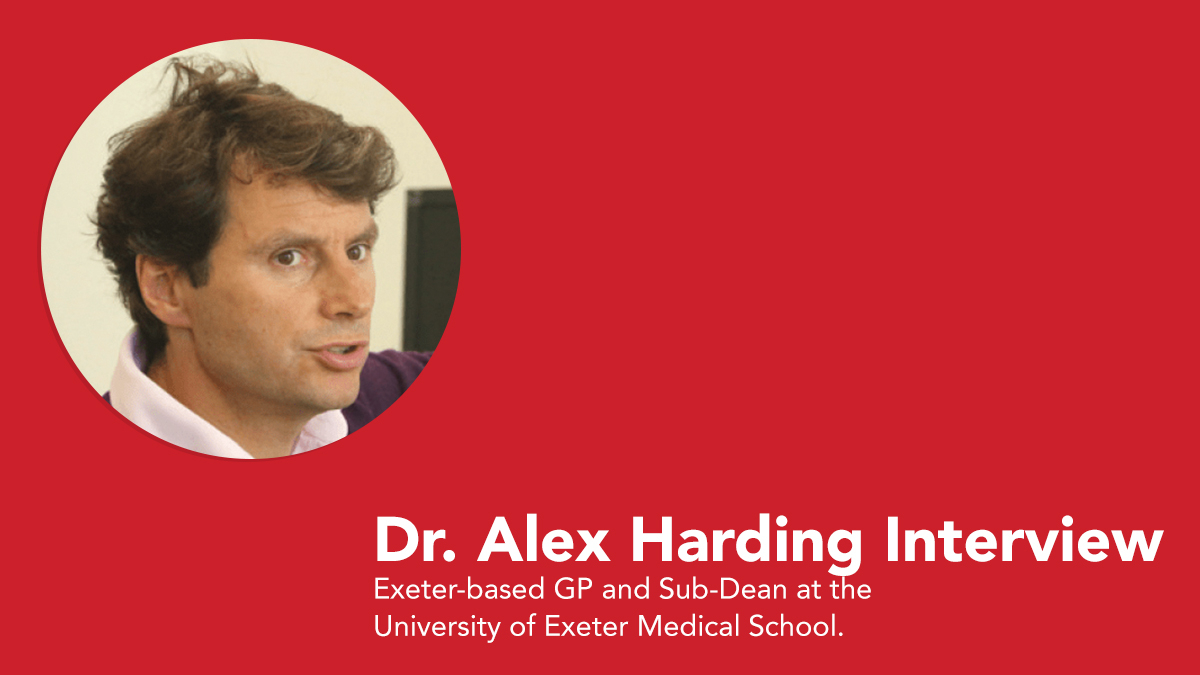Exeter-based GP and Sub-Dean at the University of Exeter Medical School.
Interviewed by Theodore Howard year 4, Medicine, University of Exeter Medical School
What made you decide to do your PhD?
The honest answer is quite a few things:
1) I thought it would focus my interest on one area.
2) When you spend time with people who have doctorates, you begin to realise a change in the way you think – in how you perform critical analyses, express ideas, and present them on paper. It gives you a pretty impressive skillset.
3) There is no doubt that a doctorate is a qualification that opens doors.
Where does your interest in clinical education stem from?
I enjoy interactive teaching, talking and discovering things about the practice.
The experiences I had whilst at medical school were absolutely rubbish. I couldn’t believe that education could be delivered that badly. We spent time hanging around wards being ignored, or being rude to, and experienced lectures which were, quite frankly, boring. I had looked at medical school as the absolute pinnacle of aspiration, thinking it would deliver more than that. I was very disappointed. Surely there were better ways of delivering knowledge.
As I became more involved with medical education, one of the things that motivated me was the expense. We are very lucky to have the resources we do. Therefore, we all have a duty to make sure public money is spent wisely.
Could you summarise what you discovered during your recent thesis?
In a nutshell, the thesis looks at how clinical students learn on the wards.
I was specifically interested in what happened following the ward rounds – when the consultant sends students to see patients.
They are suddenly thinking, “Oh God, what do I do now?” How do you get from that position to learning something from a patient?
I found that to facilitate clinical learning in an environment like a hospital, you have to have a whole host of factors singing together. And these harmonise to what they call ‘socio-material networks’.
Students must present themselves in a certain way: how they dress, speak and even carry themselves may very well determine whether they find themselves exposed to the patient contact that is crucial for effective learning. These social factors intermingle with material elements such as ensuring the students have cards that will allow access into the necessary wards.
One of the principal findings was that, in order to form a network, an inordinate amount of time and energy is required.
How do you hope your thesis will change the medical curriculum?
One of the points of interest is to make a more engaging curriculum by designing a learning programme to help modern medical students.
Initially, students do not know the consultants, nurses, or (most importantly) the junior doctors. So we have put into place changes that allow better and easier communication between students and junior doctors.
Moreover, particular attention should be drawn to the lack of teaching about the technical elements of a hospital. My research showed that students did not know how to operate bleep systems, door access codes or even where to access toilets. These simple things can really impinge on their learning.
The research also has theoretical outcomes. The dominant idea is that medical students learn through becoming part of a community of practice, as a member of a team, but I do not think this occurs. In fact, it is quite the reverse and they are often excluded. If you look at the way medical students learn in the 21st century: they learn through short-lived but very intense learning networks where a number of things come together and fire off.
Methodologically, I have stressed the importance of actually observing medical student learning rather than interpreting what they say, as these can be very different. For the first time, I was applying ‘Actor-Network theory’ to interpret observations of medical student learning.
What were the highs and lows during your thesis?
I have never been so intellectually stretched – it was fascinating!
However, writing up the thesis was a massive task that took more time than I thought it would. I had to work at weekends and late at night, which had an impact on my family and social life.
And understanding the level of precision and clarity needed, as well as the need to repeatedly revise what you have written, were quite tough aspects of it.
What is your advice for students interested in research? Think of the Nike advert – Just Do It! Really. Just get yourself stuck in and start something!

